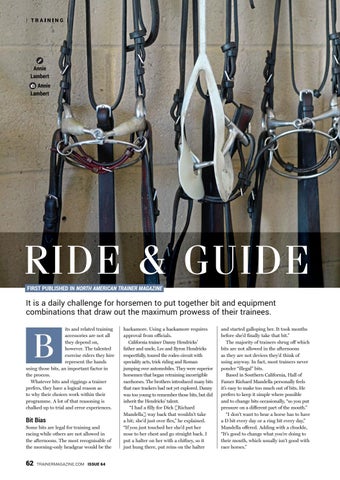| TRAINING |
Annie Lambert Annie Lambert
RIDE & GUIDE FIRST PUBLISHED IN NORTH AMERICAN TRAINER MAGAZINE
It is a daily challenge for horsemen to put together bit and equipment combinations that draw out the maximum prowess of their trainees.
B
its and related training accessories are not all they depend on, however. The talented exercise riders they hire represent the hands using those bits, an important factor in the process. Whatever bits and riggings a trainer prefers, they have a logical reason as to why their choices work within their programme. A lot of that reasoning is chalked up to trial and error experiences.
Bit Bias
Some bits are legal for training and racing while others are not allowed in the afternoons. The most recognisable of the morning-only headgear would be the
62
TRAINERMAGAZINE.COM ISSUE 64
hackamore. Using a hackamore requires approval from officials. California trainer Danny Hendricks’ father and uncle, Lee and Byron Hendricks respectfully, toured the rodeo circuit with speciality acts, trick riding and Roman jumping over automobiles. They were superior horsemen that began retraining incorrigible racehorses. The brothers introduced many bits that race trackers had not yet explored. Danny was too young to remember those bits, but did inherit the Hendricks’ talent. “I had a filly for Dick [Richard Mandella] way back that wouldn’t take a bit; she’d just over flex,” he explained. “If you just touched her she’d put her nose to her chest and go straight back. I put a halter on her with a chifney, so it just hung there, put reins on the halter
and started galloping her. It took months before she’d finally take that bit.” The majority of trainers shrug off which bits are not allowed in the afternoons as they are not devices they’d think of using anyway. In fact, most trainers never ponder “illegal” bits. Based in Southern California, Hall of Famer Richard Mandella personally feels it’s easy to make too much out of bits. He prefers to keep it simple where possible and to change bits occasionally, “so you put pressure on a different part of the mouth.” “I don’t want to hear a horse has to have a D bit every day or a ring bit every day,” Mandella offered. Adding with a chuckle, “It’s good to change what you’re doing to their mouth, which usually isn’t good with race horses.”
